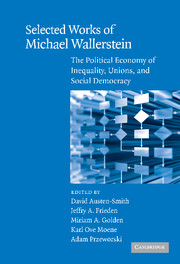 Selected Works of Michael Wallerstein
Selected Works of Michael Wallerstein Published online by Cambridge University Press: 27 January 2010
Introduction
Unions are in big trouble, as everyone knows. Under attack by conservative politicians, battered by overseas competition, threatened by capital flight, bewildered by changes in the nature of work, and shackled by an outmoded egalitarian ideology, unions increasingly appear like large but aging dinosaurs struggling to adapt as the climate changes. The proportion of workers who belong to unions is in decline. Centralized systems of wage-setting are breaking apart. Incentive pay schemes and profit-sharing arrangements subvert negotiated wage scales. Wage inequality is growing while the median wage stagnates. Past achievements are under attack as European governments blame “labor market rigidities,” i.e. the legal and contractual protections that current workers enjoy, for persistently high unemployment. Even the unions' traditional political allies, the social democratic and labor parties, are keeping their distance, having discovered that being too closely tied to the unions is a political liability.
As is usually the case, what everyone knows to be true is not completely wrong but not completely right either. In this paper, we aim to describe, as precisely as the data allow, what is and is not known about the changing terrain of industrial relations in advanced industrial societies in the postwar period. We survey the empirical research that seeks to explain cross-national and longitudinal variation in union organization and wage-setting procedures. We do not attempt to provide country-by-country descriptions.
To save this book to your Kindle, first ensure [email protected] is added to your Approved Personal Document E-mail List under your Personal Document Settings on the Manage Your Content and Devices page of your Amazon account. Then enter the ‘name’ part of your Kindle email address below. Find out more about saving to your Kindle.
Note you can select to save to either the @free.kindle.com or @kindle.com variations. ‘@free.kindle.com’ emails are free but can only be saved to your device when it is connected to wi-fi. ‘@kindle.com’ emails can be delivered even when you are not connected to wi-fi, but note that service fees apply.
Find out more about the Kindle Personal Document Service.
To save content items to your account, please confirm that you agree to abide by our usage policies. If this is the first time you use this feature, you will be asked to authorise Cambridge Core to connect with your account. Find out more about saving content to Dropbox.
To save content items to your account, please confirm that you agree to abide by our usage policies. If this is the first time you use this feature, you will be asked to authorise Cambridge Core to connect with your account. Find out more about saving content to Google Drive.